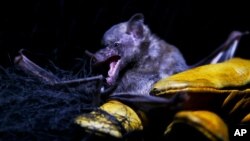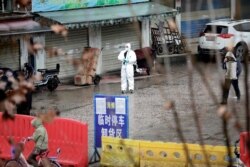The World Health Organization and two other global agencies called on countries Tuesday to consider suspending the sale of live, wild mammals in food markets to prevent the spread of emerging infectious diseases in humans.
In addition to the WHO, the World Organization for Animal Health and the United Nations Environment Program warned the mammals may be the source of more than 70% of such diseases.
Their recommendations to help ensure the safety and sustainability of the international food system comes after the WHO led a mission to Wuhan, China, to investigate the origin of the coronavirus that causes COVID-19.
The team of investigators who visited Wuhan’s Huanan market, where the first human COVID-19 infections were identified, said the new coronavirus was likely spread from bats to humans through another animal.
“This is not a new recommendation, but COVID-19 has brought new attention to this threat given the magnitude of its consequences," WHO spokeswoman Fadela Chaib said at a news briefing in Geneva.
The guidance aims to “reduce the risk of transmisison of COVID-19 and other zoonoses in traditional food markets,” the organizations said.
The guidance asserts that traditional food markets forced to comply with high hygiene standards were safe for employees and customers, but it warns major problems could occur when they permit the sale and slaughter of live wild animals in open public settings.
“When wild animals are kept in cages or pens, slaughtered and dressed in open market areas, these areas become contaminated with body fluids, feces and other waste, increasing the risk of transmission of pathogens to workers and customers and potentially resulting in spillover of pathogens to other animals in the market,” the guidance said.
“Such environments provide the opportunity for animal viruses, including coronaviruses, to ampilfy themselves and transmit to new hosts, including humans,” the guidance added.
The agencies recommend raising hygiene standards in traditional food markets and tightening control over raising and selling wild animals destined to be sold in food markets.
They also call for more training for food and veterinary inspectors, improved surveillance for animal virus outbreaks, and food safety information campaigns targeting market workers and customers.









